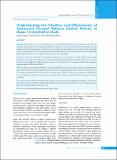Please use this identifier to cite or link to this item:
https://hdl.handle.net/20.500.14356/1155Full metadata record
| DC Field | Value | Language |
|---|---|---|
| dc.contributor.author | Shakya, Sangita | - |
| dc.contributor.author | Shrestha, Inisa | - |
| dc.contributor.author | Pradhan, Pranil Man Singh | - |
| dc.date.accessioned | 2023-04-28T07:17:24Z | - |
| dc.date.available | 2023-04-28T07:17:24Z | - |
| dc.date.issued | 2021 | - |
| dc.identifier.citation | ShakyaS., ShresthaI., & PradhanP. M. S. (2021). Understanding the Situation and Effectiveness of Adolescent Focused Tobacco Control Policies in Nepal : A Qualitative Study . Journal of Nepal Health Research Council, 19(03), 563-567. https://doi.org/10.33314/jnhrc.v19i3.3643 | en_US |
| dc.identifier.issn | Print ISSN: 1727-5482; Online ISSN: 1999-6217 | - |
| dc.identifier.uri | http://103.69.126.140:8080/handle/20.500.14356/1155 | - |
| dc.description | Original Article | en_US |
| dc.description.abstract | Abstract Background: Tobacco use is a major risk factor for non-communicable disease that contributes two third of deaths in Nepal. Tobacco related premature deaths are estimated to rise every year if effective interventions are not implemented. In Nepal majority of smokers start using tobacco in their adolescence. Despite the enforcement of tobacco control law in 2011, the use among adolescents remains high. Hence, this study was carried out to understand the situation and effectiveness of adolescent focused tobacco control policies. Methods: Data were collected by focus group discussions in seven provinces of Nepal. Total 28 focus group discussions were carried out with four in each province incorporating both genders. Adolescents between age of 13 and 18 years attending both public and private schools were selected. Data were analyzed manually using a thematic analysis method in MS Excel and Word. Results: Tobacco control law on prohibition of sale and distribution of tobacco products to minors and prohibition of sale within 100-meter radius of educational institutions were not implemented properly. Adolescents’ students were not stopped and inquired about their age and could easily access tobacco at shops nearby school area. Shopkeepers were not hesitant to sell tobacco to adolescents in school uniform, if they are purchasing for their parents or family members. Conclusions: The adolescent focused tobacco control laws have not been implemented effectively. The current provisions of tobacco control law needs stronger adherence and strict enforcement in order to protect the adolescents from the burgeoning epidemic of tobacco use. Keywords: Adolescent; prevention; tobacco; tobacco policy | en_US |
| dc.language.iso | en | en_US |
| dc.publisher | Nepal Health Research Council | en_US |
| dc.relation.ispartofseries | July-Sep, 2021\;3643 | - |
| dc.subject | Adolescent | en_US |
| dc.subject | prevention | en_US |
| dc.subject | tobacco | en_US |
| dc.subject | tobacco policy | en_US |
| dc.title | Understanding the Situation and Effectiveness of Adolescent Focused Tobacco Control Policies in Nepal : A Qualitative Study | en_US |
| dc.type | Journal Article | en_US |
| local.journal.category | Original Article | - |
| Appears in Collections: | Vol. 19 No. 03 (2021): Vol 19 No 3 Issue 52 Jul-Sep 2021 | |
Files in This Item:
| File | Description | Size | Format | |
|---|---|---|---|---|
| 3643-Manuscript-25076-1-10-20211215.pdf | Fulltext Download | 233.41 kB | Adobe PDF |  View/Open |
Items in DSpace are protected by copyright, with all rights reserved, unless otherwise indicated.
